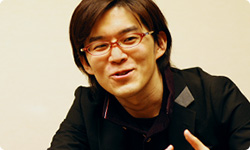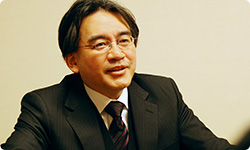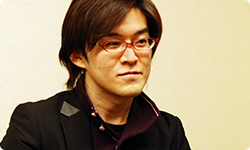2. Coming Down Off Your High Horse
When I think back to when I first got out of university, I began by making all kinds of things and showing them to people. Game design theory hadn’t progressed very far at that point, so I wondered, “Will my ideas really get across to people?”
Yeah. My abilities today are the result of what my forerunners did multiplied by my own experience. In university, I had zero experience, so whatever I multiplied it by resulted in zero.
Put another way, you start at zero, so then when you go out into the world and see what those ahead of you are doing professionally, you’re a blank canvas and are ready to learn. But young people tend to talk about how capable they are, so...you don’t really start until you remove that façade.
Right. This may be a strange way to put it, but I always tell newcomers, “You don’t gain any real experience until you come down off your high horse.” (laughs)

Ahh... That expression really portrays the athletic club atmosphere of Team Ninja. (laughs)
Oh? (laughs) When you’re on a development team, you notice the moment you start making a game fun. You become aware of what you can do to make the game fun in a particular way.
Sometimes fiddling with just one thing makes a big change in the overall impression that the game makes. A real planner can pinpoint those critical places.
That’s right. I really enjoy how daily decisions result in steady improvement. This time, in making software for the Nintendo 3DS system, which was new hardware still under development, it was hard to see the goal, but as a game maker, it was fun.
Like making games is itself a game? (laughs)
Yeah! (laughs) The less you can see ahead, the harder it is for the staff. The people around you worry, but it’s fun.
When you describe something like that as “fun,” it’s convincing because of the challenges you have overcome. How long did it take for you to acquire such fortitude?
After participating in several projects as a planner, in about my fourth year, I took full charge of one. That was the first time that I ever experienced being in a position to land a project by deadline. When we make a game, we often use the word “land,” because making a game is just like landing an aeroplane.
To take that analogy a little further, as you’re flying an aircraft, you look for an appropriate place to land. Were you able to land that first project well?
Yes. I landed it, but I wasn’t very satisfied with it. Then, as the projects I was in charge of got bigger, uncertainties increased and I learned that you have to fly each project a different way.
So the projects you were in charge of came with increasingly heavy responsibility?
Yes. I feel like that too was fate blessing me.
To be honest, for you to coordinate Team Ninja at such a young age is... I mean, my generation didn’t have anyone ahead of it, so to do that in your generation, which has more experienced people already in place, is rare. I’m interested in what kind of experiences you’ve had. I don’t suppose it has all been smooth sailing.

No. It started when Team Ninja decided to do a big project and a small project and I got to do the small project.
Why do you think they had you do it?
Hmm...I wonder. I don’t remember if I just took it for myself or if my boss made the decision, but I didn’t want to be in the big project if it meant I had to be in a position that wouldn’t have anything to do with what made the game fun. Working on that small project was a valuable experience for me.
I was lucky, because back when there wasn’t anyone above me, I could think on my own, then in a group of 3, then a group of 5, then of 10... taking steps gradually, so I’m really interested in what kind of steps someone like you in the much younger generation took to get his hands on such a big project as this one and at such a young age.
In addition to the company goal of putting out one game each year, I had a two- or three-year project to work on. Each year, the amount of work increased until I could handle several projects a year. I was lucky that I could take gradual steps to broaden the areas that I was in charge of.
When did you become able to handle several things at once?
When I was about 27. But at that time, to liken myself to a computer, I thought my CPU wasn’t good enough.
You didn’t have quite enough power for multitasking.9 (laughs) 9Multitasking: A term in computing that signifies one computer appearing to perform several processes simultaneously. Here it means one person working on several projects at once.
Right. I was down on myself and thought, “I’m no good...” but when you have several projects that you really have to take care of, you don’t have time for the blues and can be stronger somehow. (laughs) Then when I did, I realised, “Oh, humans can grow,” so I’m happy to be able to notice that. (laughs)
Ah, that’s nice. I love to see someone enjoying making something. I think I would do anything in my power to increase the number of opportunities for that to happen. That’s one motivation in my work.
I think a developer’s happiness is reflected in the games he or she makes.
That’s right. Clearly, something infuses the product.
Developers spend one to two years working on a game. You could even say it’s a way of life that radiates from what they make.
You can see whether the team was in high spirits or just muddling through it.
At first, I thought video games just fell from the sky. Back then, I couldn’t see the developers, but now I can see the human hand at work in video games - the developers’ feelings, so to speak. (laughs) Ever since I noticed that, they’re quite precious to me. During development, the developers live with that one game. But I would like everyone who plays those games to simply enjoy the resultant games, without minding too much about us.

It’s pleasing if players just feel, “The developers put a lot of work even into this kind of thing.”
Right. They don’t have to praise it. They can say it’s stupid or irritating. I’m just happy with some kind of reaction.
To the developers, ignoring it is the worst thing. Criticism spurs them on the next time. No matter how hard they work, they do so under time constraints and other restrictions, so the developers always have to feel that they might have been able to do more.
That’s right. But since customers pay money for our games, we can’t make excuses. I want to provide games that we think are worth paying money for.
You don’t make excuses, but you can make use of your own dissatisfaction the next time. It motivates you the next time you make something.
Right. Every project starts with something from the past that needs to be improved. Doing that each year is a blast!